Readings Newsletter
Become a Readings Member to make your shopping experience even easier.
Sign in or sign up for free!
You’re not far away from qualifying for FREE standard shipping within Australia
You’ve qualified for FREE standard shipping within Australia
The cart is loading…






Brown reflects on anti-London sentiment in the UK as the capital continues to gain power.
The United Kingdom has never had an easy relationship with its capital. By far the wealthiest and most populous city in the country, London is the political, financial, and cultural center of the UK, responsible for almost a quarter of the national economic output. But the city’s insatiable growth and perceived political dominance have gravely concerned national leaders for hundreds of years.
This perception of London as a problem has only increased as the city becomes busier, dirtier, and more powerful. The recent resurgence in anti-London sentiment and plans to redirect power away from the capital should not be a surprise in a nation still feeling the effects of austerity. Published on the eve of the delayed mayoral elections and in the wake of the greatest financial downturn in generations, The London Problem asks whether it is fair to see the capital’s relentless growth and its stranglehold of commerce and culture as smothering the United Kingdom’s other cities, or whether as a global megacity it makes an undervalued contribution to Britain’s economic and cultural standing.
$9.00 standard shipping within Australia
FREE standard shipping within Australia for orders over $100.00
Express & International shipping calculated at checkout
Brown reflects on anti-London sentiment in the UK as the capital continues to gain power.
The United Kingdom has never had an easy relationship with its capital. By far the wealthiest and most populous city in the country, London is the political, financial, and cultural center of the UK, responsible for almost a quarter of the national economic output. But the city’s insatiable growth and perceived political dominance have gravely concerned national leaders for hundreds of years.
This perception of London as a problem has only increased as the city becomes busier, dirtier, and more powerful. The recent resurgence in anti-London sentiment and plans to redirect power away from the capital should not be a surprise in a nation still feeling the effects of austerity. Published on the eve of the delayed mayoral elections and in the wake of the greatest financial downturn in generations, The London Problem asks whether it is fair to see the capital’s relentless growth and its stranglehold of commerce and culture as smothering the United Kingdom’s other cities, or whether as a global megacity it makes an undervalued contribution to Britain’s economic and cultural standing.